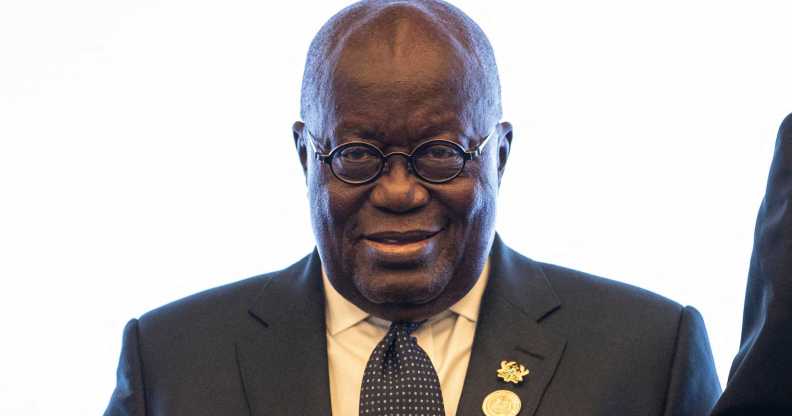Ghana delays action on draconian anti-LGBTQ+ bill after court challenge and economic warning

President of Ghana Nana Akufo-Addo (Amanuel Sileshi / AFP)
Ghana’s president has said he will delay his consideration of an anti-LGBTQ+ bill passed by parliament last week, amid a legal challenge and warnings it could lead to the country losing billions in funding.
In a statement shared on Facebook, president Nana Akufo-Addo said a “challenge has been mounted at the Supreme Court by a concerned citizen to the constitutionality of the proposed legislation” and that he will await the decision of the court before action is taken in regards to the bill.
Akufo-Addo also said he is aware the bill has “raised considerable anxieties in certain quarters of the diplomatic community and amongst some friends of Ghana that she may be turning her back on her, hitherto, enviable, longstanding record on human rights observance and attachment to the rule of law”.
He continued: “I want to assure you that no such back-sliding will be contemplated or occasioned.”
The decision follows a warning to Akufo-Addo from the Finance Ministry of Ghana, which was leaked to several news publications. It urges him to hold off signing the bill into law because the country might lose up to $3.8 billion (close to £3 billion) in World Bank funding, a situation which could affect Ghana’s economic recovery.
The proposed legislation – the Human Sexual Rights and Ghanaian Family Values Bill – was passed unanimously by the country’s parliament on 28 February.
Homosexual acts are already illegal in the West African nation, but the new law would impose a prison sentence of up to three years for anyone simply identifying as LGBTQ+.
Those who organise or fund queer groups face up to five years in prison, and the punishment is even harsher for those who advocate for LGBTQ+ minors, with a possible jail sentence of 10 years.
After a Ghanian bill is passed by parliament, the president has seven days to sign it into law. If he does not, he has 14 days to give his reasons.
The BBC has reported that Akufo-Addo is holding meetings with senior figures to assess the impact of enforcing the bill, which has been widely criticised by LGBTQ+ and human rights groups.
‘Shocking and deeply disappointing’
Human Rights Watch researcher Larissa Kojoué urged the president to veto the legislation, saying it “flies in the face of the country’s international human rights obligations”.
She went on to say: “Such a law would not only further erode the rule of law in Ghana, but could also lead to further gratuitous violence against LGBT people and their allies. Ghana’s assaults on LGBT rights contradict its self-image as one of the friendliest nations in the world, and a safe, peaceful and hospitable country.
“The president should do the right thing by preserving civic space and protecting freedoms of speech and assembly, and veto the bill.”
Amnesty International‘s Ghana country director, Genevieve Partington, described the passage of the bill as “shocking and deeply disappointing”, especially coming “shortly after Ghana was elected to serve at the United Nations Human Rights Council”.
Partington continued: “The bill is one of the most draconian in Africa and seeks to further criminalise lesbian, gay, bisexual and transgender people.
“It also seeks to punish anyone who supports or advocates for LGBT people, including human rights defenders, medical professionals, journalists, teachers and landlords, in violation of the right to freedom of expression and association.
“LGBTI people have already reported forced evictions, loss of jobs, increased violence and other violations of the rights guaranteed by the country’s constitution, since the bill was introduced in parliament.
“Amnesty International urges president Nana Akufo-Addo to respect the human rights of all persons and not to sign this extreme form of discrimination into law, affecting everyone in the country.”
Last year, the passage of Uganda’s harsh anti-Homosexuality law prompted the World Bank to halt new loans to the East African country.
A spokesperson for the bank said the legislation fundamentally contradicted their values.
“We believe our vision to eradicate poverty on a liveable planet can only succeed if it includes everyone irrespective of race, gender or sexuality. This law undermines those efforts. Inclusion and non-discrimination sit at the heart of our work around the world,” they added.

